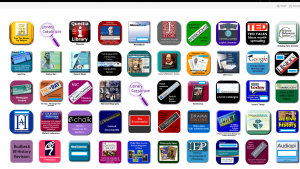I was asked by one of our suppliers of online resources, JCS Online Resources, to write a blogpost for them about the developments made to the library at Wellington College over the past 5 years. I thought it might be useful to add to our own Library blog as a way of highlighting the role of the library in our school. Below is a version of that post.
Wellington College Library: Developing Independent Learners
Lucy Atherton, Head Librarian at Wellington College discusses the changes made to The Mallinson Library at Wellington College…
In 2012 the library at Wellington College underwent a huge transformation. The rooms of the existing building were brought together to provide a modern, inspiring learning environment for the whole school community. The glass walled pods, each with a giant touch screen computer, lend themselves to collaborative working by our students and the BYOD (Bring Your Own Device) policy means space has been generated by the removal of desktop PCs.
At the heart of the library is a print book stock of around 10,000 items with an additional 20,000 books housed in departmental libraries spread out over the teaching areas of the campus and over 60 magazines and journals. We also have many digital resources, see below, and Browns Books for Students VLeBooks platform enabling students to read on iPads, smart phones and computers.
We invested in a large quantity of huge bean bags to maximise use of the grassy quad in front of the library for informal learning and revision.
The library’s key goals are to support pupil learning, encourage wider reading and nourish intellectual growth by fostering scholarship alongside supporting teaching staff with resources and a flexible workspace. The library accommodates a range of activities from individual study in the small glass pods to collaborative learning in the larger rooms. The library has a set of iPads which students can borrow to use in the library.
Library staff are fully involved in the school’s aim of developing independent learners. The two professional librarians deliver a 3-session course on research skills and referencing to year 9. These newly acquired skills are put to good use in an independent research project – students choose a subject they are fascinated by and use the library catalogue, book stock and online resources to source reliable information.
Digital resources
Over the years the librarians have built up an extensive e-Library of authoritative sources ranging from generic encyclopedias to subject specific sources such as History Study Centre and Gale Historical Newspapers. We also have Audiopi revisions podcasts which are proving particularly popular with our GCSE English students. The Day News Service for schools provides 3 balanced articles each day with additional links, glossaries and questions. It also gives us short articles in modern foreign languages – very useful as topical news resources for the MFL Department.
Three key resources for our 6th form students are Cambridge Companions, Questia School and the JSTOR Secondary Schools Collection. Questia School is a vast wide-ranging database of e-books, newspaper articles and scholarly articles. Each student has a login so they can save search results to project folders and bookmark or annotate resources. Our school-wide licence to JSTOR complements the content in Questia School, providing high level scholarly articles to support the IB Extended Essay and coursework as well as A level coursework and the EPQ.
Whilst we use JCS for a several of our e-resources we also go direct to other publishers and agents to supplement our e-Library as you can see from our Sharepoint page below.
E-Library on Sharepoint

When the school moved from an Intranet to using Microsoft Sharepoint I wanted to ensure that the e-Library looked attractive and inviting – a visual experience rather than simply a list of links where resources can get lost. I created an icon for each resource resembling apps. The resources are also arranged in subject specific pages creating smaller sub-sets to help with locating them.
Promotion
To maximise use of these online resources it is essential to make staff and students aware of them. Here are some ways I try to publicise what is available on the e-Library:
- Attending academic departmental meetings to demonstrate subject specific articles and raise awareness.
- Flag up new online resources via our weekly emailed Library News Digest.
- Remind students of the key resources in end of term letters.
- Run sessions on the e-Library for all L6th students.
- Run sessions according to academic subject on online resources for IB students once they have chosen their Extended Essay topic.
- Provide new teaching staff induction on the e-Library.
- Talk to staff at every opportunity about resources which might be relevant to them!
- Use Twitter and the Library blog for promotion.
Conclusion
We aim to make the library as welcoming as possible and reduce barriers to learning. It is wonderful to see students from different year groups working together, an informal tutorial taking place on the relaxed seating or a game of big chess going on in the Garden Room.